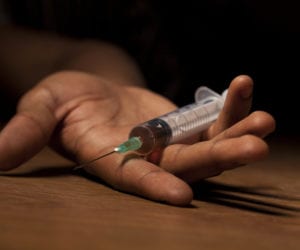10 Signs of Heroin Addiction

How to recognize the signs of heroin addiction
Are you concerned that someone you know is struggling with an addiction to heroin? Heroin addiction has reached epidemic proportions in recent years, with everyone from high school athletes to middle-aged parents and even seniors falling prey to the clutches of this insidious drug. Learning how to recognize the physical and behavior signs of heroin addiction may enable you to get someone you love into treatment so they can beat their addiction before disastrous consequences occur. Here are the top ten signs of heroin addiction, in no particular order:
- Slurred speech and disorientation
The immediate side effects of heroin use last approximately four to five hours after users ingest the drug. The signs of heroin use include slurred speech and disorientation, along with dilated pupils, shallow breathing, and dry mouth. - Marked drowsiness
Once the initial rush that heroin creates passes, addicts experience a long period of drowsiness. They may appear exhausted and begin nodding off, suddenly falling asleep in the middle of a conversation while they are actually speaking. This advanced level of sedation, called “on the nod,” among heroin users, is considered the precursor to overdose. It indicates a dangerous level of respiratory system depression that can cause addicts to stop breathing and fall into a coma. - Negative changes in personal appearance
As heroin becomes the focus of addicts’ lives, personal grooming becomes less important. They stop bathing as frequently and may begin to look grubby and disheveled. Their skin may appear pasty from lack of exposure to sunlight. - Sudden weight loss
Heroin use can cause a severe decrease in appetite, causing abrupt drops in weight. Even if heroin addicts do not lose excessive amounts of weight, they may appear gaunt, as if their skin is stretched over their bones. - Needle marks
As heroin use progresses into addiction, users switch to injecting the drug in order to get a more intense high. This intravenous drug use leaves addicts with needle scars and bruises (commonly known as “track marks”) on their arms and hands. Addicts who are trying to conceal the visible signs of heroin use may inject on their ankles, on their neck, or between their toes, where the scars are harder to perceive. If someone you suspect is addicted to heroin suddenly begins wearing long-sleeved shirts even if the temperature is inappropriately warm, he or she may be covering up track marks. - Severe itching
Heroin is an opioid drug that causes histamines to be released in the body, creating intense feelings of itchiness and a runny nose. - Withdrawal from people and activities
Heroin addicts lose interest in the activities that used to give them pleasure, and they feel disconnected from their friends, lovers, and family. They begin to withdraw from the people and activities in their lives, and focus on the drug to the exclusion of all else. - Financial troubles and missing valuables
As heroin addiction progresses, addicts run through all their money buying drugs. To keep feeding their habit, heroin addicts will pawn, trade, or sell their possessions in order to get more drugs. - Lying, stealing, and manipulation
Heroin causes intense cravings that overwhelm the areas of the brain that deal with impulse control and overrides morals. Addicted individuals will do anything to obtain more heroin, including stealing from friends and loved ones and manipulating them to get what they want. - Drug paraphernalia
One of the signs that heroin use has progressed to addiction is a sudden sloppiness in hiding the visible signs of heroin use, such as paraphernalia involved in using the drug. If you find syringes, glass or metal pipes, small plastic baggies or rubber balloons, it is time to admit that the possibility of heroin addiction has become a certainty.
Heroin treatment options
If someone you know is displaying several of these warning signs of heroin addiction, they should not try to quit the drug on their own because withdrawal symptoms from heroin addiction can be severely unpleasant and even life-threatening. Medically supervised detox at a heroin treatment center where professionals can alleviate the worst symptoms is the best solution. When followed by a stay at a 90 day inpatient heroin addiction treatment center, this plan offers addicted individuals the best chance of long-term recovery.
If you or a loved one needs help with abuse and/or treatment, please call the WhiteSands Treatment at (877) 855-3470. Our addiction specialists can assess your recovery needs and help you get the addiction treatment that provides the best chance for your long-term recovery.
